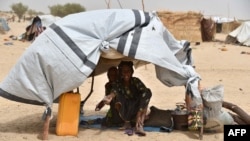Ahead of World Refugee Day on Monday, U.N. agencies say rapid assistance is needed for the more than 2.7 million people displaced by the Boko Haram insurgency in the Lake Chad Basin over the past three years. The United Nations has called it the fastest growing displacement crisis in Africa.
Security continues to deteriorate in southeast Niger following a fresh spate of attacks by Boko Haram this month.
Tens of thousands of people have flooded the city of Diffa after militants attacked the border town of Bosso. Diffa was already hosting 240,000 displaced people, many of them from Nigeria.
Belkacem Machane, the deputy country director for the World Food Programme (WFP) in Niger just returned from a visit to the worst affected areas.
“We went through the main road called ‘Route Nationale Numero 1,’ which is the main road going to Bosso and we saw so many people moving around the road," said Machane. "About 40,000. Mainly women and kids. Their situation was really bad. They are lacking water, food, shelter. And this was shocking.”
WFP distributed 15-day emergency food rations to more than 1,400 newly displaced people.
More food aid is on its way. The WFP says it hopes to be able to feed 250,000 people in Diffa. But the area was chronically food insecure even before the conflict and the influx of refugees.
Agricultural production there was below average last year. Insecurity has closed some markets. Across the border in northeast Nigeria, an estimated 16 million people also need food aid.
But U.N. officials say delivering aid is difficult. Insecurity is an issue and a number of people have had to flee multiple times.
“We work together with the police and with the military to reorient them to those localities where they can [safely] stay," said Liz Ahua, UNHCR's regional representative.
"And this is not easily done because quite obviously, if you are talking of Lake Chad Basin, the governments are very stretched in terms of their capacity to look after the protection of these people," she added.
Ahua said things such as health centers are very few in the region. "And we are hard-pressed to provide support to the internally displaced and the refugees. ... There are people who are not receiving the help they need.”
U.N. agencies are requesting more than $500 million to deliver assistance to some five million people in the region. So far, that appeal is just 20 percent funded.




